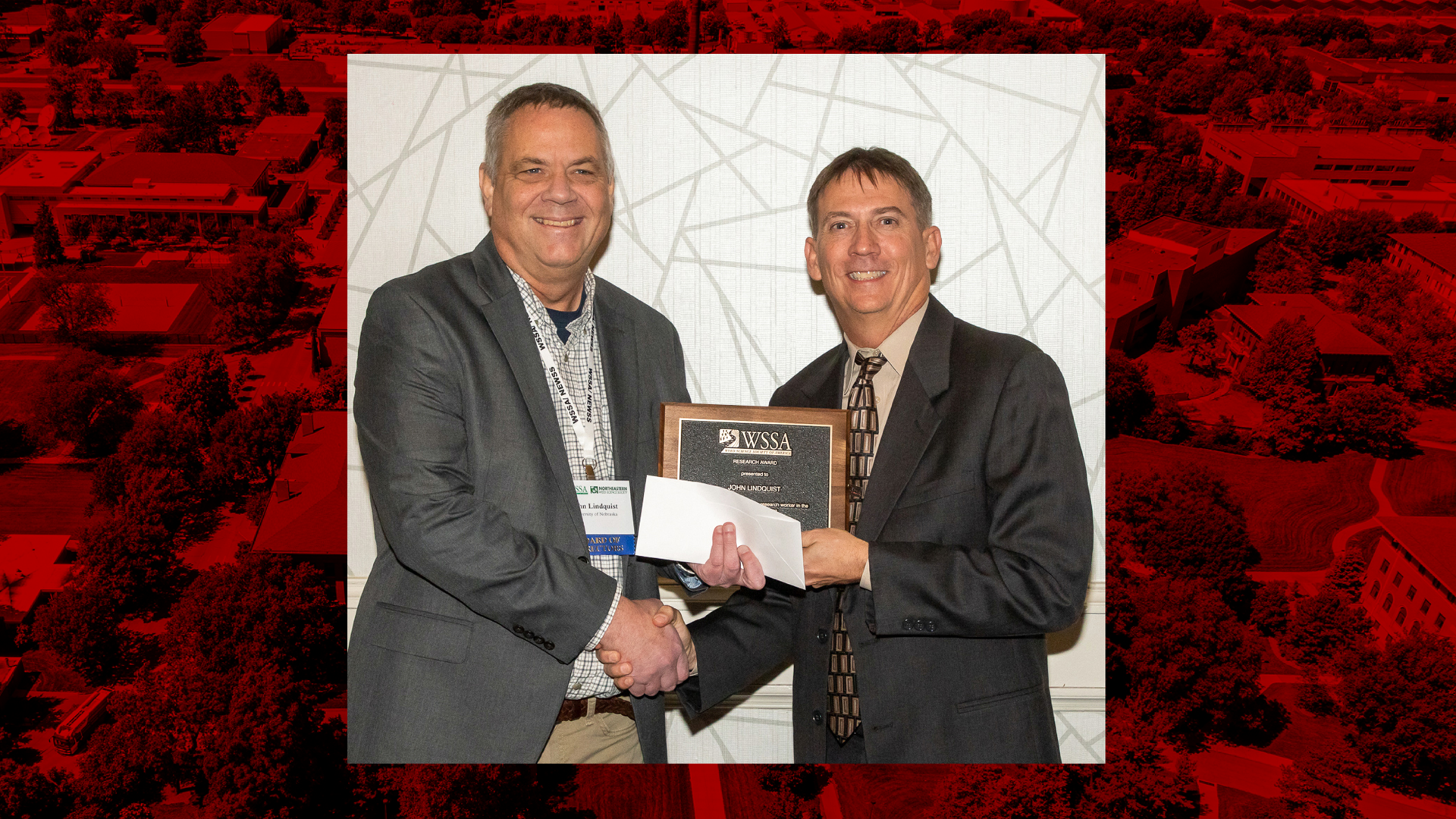
John Lindquist, University of Nebraska–Lincoln professor of agronomy and horticulture, was honored with the Outstanding Research Award by the Weed Science Society of America during the joint WSSA and Northeastern Weed Science Society annual meeting in Arlington, Virginia, Jan. 30.
This award is for WSSA members who have conducted creative and innovative research with a significant impact on the scientific concepts or practices of weed science and was established to recognize outstanding contributions to both applied and basic weed science research.
“The WSSA has been my home professional society since I started grad school in the early 1990’s. That this society has accepted my research and awarded it on several occasions has been validating and humbling, and I am indebted to those that have preceded me as well as those that have worked with and supported my program over the past, nearly 30 years,” Lindquist said.
Lindquist completed his bachelor’s degree from Montana State University in 1988 and then spent the next two years in the Philippines with the Peace Corps as an agroforestry extension specialist. He completed a master’s in weed ecology from University of Minnesota in 1994.
In 1997 Lindquist completed his doctoral degree and began his professional career as an assistant professor of agronomy, both at Nebraska in the Department of Agronomy and Horticulture. In 2003 he was promoted to associate professor and in 2010 to professor with an 80% research and 20% teaching appointment. He also served as associate department head from 2019-2022.
Lindquist has served on numerous WSSA committees and currently serves as the 2020–2023 Chair of the Constitution and Operating Procedures Committee and is a member the WSSA Board of Directors. Previously he served as chair of the WSSA Outstanding Graduate Student Award subcommittee and chair and vice chair of the WSSA Weed Biology and Ecology Section. He also served as an associate editor for Weed Science Journal for 17 years.
“Lindquist exhibits great enthusiasm for the weed science graduate program at Nebraska, eagerly embracing the opportunity to educate students whenever possible,” said Amit Jhala, associate professor, associate department head and extension weed management specialist in the Department of Agronomy and Horticulture.
Lindquist teaches AGRO/HORT/NRES/PLAS 426/826 Invasive Plants and AGRO 896 Interplant Competition in Managed Ecosystems.
He has served as a major advisor to seven doctoral students and 16 master’s students and has been a committee member for numerous other graduate students. Three of his students are faculty members at land grant universities.
“His students always deliver quality presentations, receive awards at professional meetings and exhibit a high knowledge of weed science which is a great reflection of his program. It is immediately apparent that he is actively involved in his student’s training and daily activities,” Jhala said.
Lindquist’s research goal has been to obtain a deeper understanding of the underlying processes controlling plant growth, interplant interactions, and weed population dynamics, and to develop methods to predict these processes. The ability to predict plant growth, interplant interactions, and weed population dynamics is a necessary precursor to the development of more sustainable methods of managing both crop and weeds in our most prevalent agroecosystems. The more applied goal of his research program is to use that mechanistic understanding and the principles of ecology to develop ecological weed management practices that may be useful for reducing our reliance on chemical weed control.
“I'm very interested in applying what we've learned through our research by incorporating results and important concepts about plant ecology into educational programs that aid producers in making decisions about best management practices in specific Nebraska environments,” Lindquist said.
“Lindquist is nationally and internationally recognized for his research on crop-weed competition, crop-weed gene flow, and integrated weed management. Collecting field data, modeling biological systems using mathematical equations and field-derived parameter estimates, and validating model predictions and accuracy are his forte,” said Rodrigo Werle, assistant professor and cropping systems weed scientist at the University of Wisconsin–Madison.
In addition to research and advising graduate students, Lindquist is a prolific author with more than 100 papers in peer reviewed journals and five invited refereed book chapters. His research has not only been published in peer-reviewed journals relevant to weed science but in extension outlets directed towards clientele and commodity groups.
More details at: https://go.unl.edu/kf06